Related Research Articles
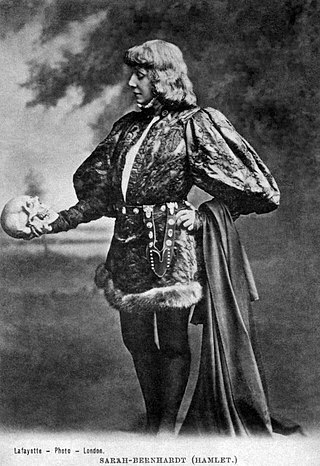
Acting is an activity in which a story is told by means of its enactment by an actor who adopts a character—in theatre, television, film, radio, or any other medium that makes use of the mimetic mode.

Konstantin Sergeyevich Stanislavski was a seminal Soviet Russian theatre practitioner. He was widely recognized as an outstanding character actor, and the many productions that he directed garnered him a reputation as one of the leading theatre directors of his generation. His principal fame and influence, however, rests on his "system" of actor training, preparation, and rehearsal technique.

Method acting, known as the Method, is a range of rehearsal techniques, as formulated by a number of different theatre practitioners, that seeks to encourage sincere and expressive performances through identifying with, understanding, and experiencing a character's inner motivation and emotions. These techniques are built on Stanislavski's system, developed by the Russian actor and director Konstantin Stanislavski and captured in his books An Actor Prepares, Building a Character, and Creating a Role.

A theatre director or stage director is a professional in the theatre field who oversees and orchestrates the mounting of a theatre production such as a play, opera, dance, drama, musical theatre performance, etc. by unifying various endeavors and aspects of production. The director's function is to ensure the quality and completeness of theatre production and to lead the members of the creative team into realizing their artistic vision for it. The director thereby collaborates with a team of creative individuals and other staff to coordinate research and work on all the aspects of the production which includes the Technical and the Performance aspects. The technical aspects include: stagecraft, costume design, theatrical properties (props), lighting design, set design, and sound design for the production. The performance aspects include: acting, dance, orchestra, chants, and stage combat.

Central Saint Martins is a constituent college of the University of the Arts London, a public art university in London, England. The college offers full-time courses at foundation, undergraduate and postgraduate levels, and a variety of short and summer courses.
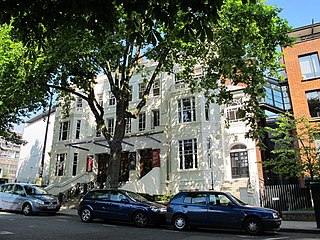
The Royal Central School of Speech and Drama, commonly shortened to Central, is a drama school founded by Elsie Fogerty in 1906, as the Central School of Speech Training and Dramatic Art, to offer a new form of training in speech and drama for young actors and other students. It became a constituent college of the University of London in 2005 and is a member of Conservatoires UK and the Federation of Drama Schools.

Stanislavski's system is a systematic approach to training actors that the Russian theatre practitioner Konstantin Stanislavski developed in the first half of the twentieth century. His system cultivates what he calls the "art of experiencing". It mobilises the actor's conscious thought and will in order to activate other, less-controllable psychological processes—such as emotional experience and subconscious behaviour—sympathetically and indirectly. In rehearsal, the actor searches for inner motives to justify action and the definition of what the character seeks to achieve at any given moment.

Physical theatre is a genre of theatrical performance that encompasses storytelling primarily through physical movement. Although several performance theatre disciplines are often described as "physical theatre", the genre's characteristic aspect is a reliance on the performers' physical motion rather than, or combined with, text to convey storytelling. Performers can communicate through various body gestures.
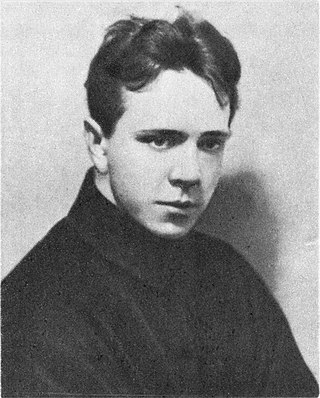
Mikhail Aleksandrovich Chekhov, known as Michael Chekhov, was a Russian-American actor, director, author, and theatre practitioner. He was a nephew of the playwright Anton Chekhov and a student of Konstantin Stanislavski. Stanislavski referred to him as his most brilliant student.

Yevgeny Bagrationovich Vakhtangov was a Russian actor and theatre director who founded the Vakhtangov Theatre. He was a friend and mentor of Michael Chekhov. He is known for his distinctive style of theatre, his most notable production being Princess Turandot in 1922.
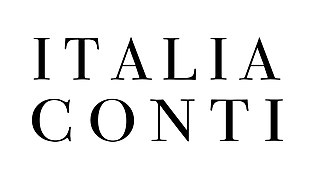
The Italia Conti Academy of Theatre Arts, also known simply as Italia Conti, is a drama school based in Woking, England. It was founded by the actress Italia Conti in 1911. Italia Conti delivers courses in acting, musical theatre, and dance, catering mostly for 16+ and 18+ students through its higher education programmes, and for younger learners (3-18yrs) through its Associate Schools and pre-vocational courses.
Yat Malmgren was a Swedish dancer and acting teacher, born in Gävle, Sweden to Gustaf Sigurd Eriksson and Signe Emma Maria Malmgren.

A drama school, stage school or theatre school is an undergraduate and/or graduate school or department at a college or university, or a free-standing institution that specializes in the pre-professional training in drama and theatre arts, such as acting, design and technical theatre, arts administration, and related subjects. If the drama school is part of a degree-granting institution, undergraduates typically take an Associate degree, Bachelor of Arts, Bachelor of Fine Arts, or, occasionally, Bachelor of Science or Bachelor of Design. Graduate students may take a Master of Arts, Master of Acting, Master of Science, Master of Fine Arts, Doctor of Arts, Doctor of Fine Arts, or Doctor of Philosophy degree.

Rose Bruford College is a higher education institution in the Greater London borough of Bexley. Bruford has degree programmes in acting, actor musicianship, directing, theatre arts and various disciplines of stagecraft.
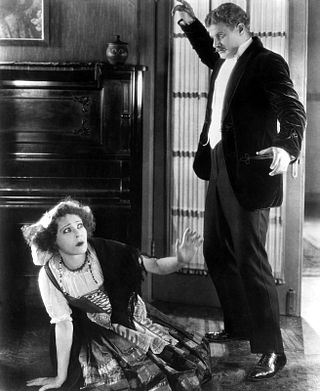
Realism in the theatre was a general movement that began in 19th-century theatre, around the 1870s, and remained present through much of the 20th century. It developed a set of dramatic and theatrical conventions with the aim of bringing a greater fidelity of real life to texts and performances. These conventions occur in the text, design, performance style, and narrative structure. They include recreating on stage a facsimile of real life except missing a fourth wall. Characters speak in naturalistic, authentic dialogue without verse or poetic stylings, and acting is meant to emulate human behaviour in real life. Narratives typically are psychologically driven, and include day-to-day, ordinary scenarios. Narrative action moves forward in time, and supernatural presences do not occur. Sound and music are diegetic only. Part of a broader artistic movement, it includes Naturalism and Socialist realism.
The Michael Howard Studios is an acting studio for the performing arts located in at 152 West 25th Street in Chelsea, Manhattan, New York City; the studio was founded in 1953 by actor/director Michael Howard.
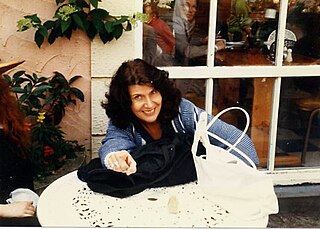
Doreen Cannon was an American actress. She trained in acting for many years, and performed in various plays in New York City, where she was born and raised. She was a prolific teacher of acting, working as Head of Acting at various drama schools. Cannon was a follower of the Stanislavski technique of method acting.
Sam Kogan was a Ukrainian actor, director, and acting teacher. He is best known for developing and establishing an acting technique that he called "The Science of Acting." He founded The School of the Science of Acting, in London in 1991. He also wrote the book The Science of Acting, which was edited by his daughter, Helen Kogan.

Marina Mechislavovna Shimanskaya is a Russian actress, pedagogue and theatre teacher.
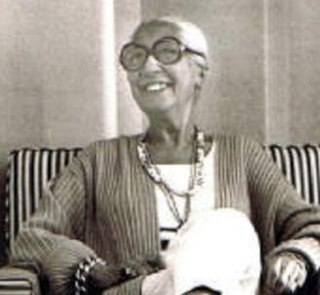
Sofia Ezarovna Shatsova Helfand, known as Sonia Moore, was a Russian Empire-born American actress, writer and acting teacher. She is known for simplifying Stanislavski's system of acting devised by Konstantin Stanislavski. Moore was a student of Yevgeny Vakhtangov, and later became an acting teacher.
References
- ↑ "Drama Centre at Central Saint Martins". Archived from the original on 19 April 2007. Retrieved 15 January 2007.
- ↑ Granger, Rachel. "Rapid Scoping Study on Leicester Drama School" (PDF). De Montfort University Leicester. Archived from the original (PDF) on 16 October 2019. Retrieved 7 September 2019.
- ↑ "Drama Centre London: About us". Archived from the original on 5 February 2007. Retrieved 15 January 2007.
- ↑ Eva Mekler, Masters of the Stage: British Acting Teachers Talk About Their Craft. New York: Grove Weidenfeld, 1989. p.69, p.75. ISBN 0-8021-3190-5.
- ↑ Eva Mekler, Masters of the Stage: British Acting Teachers Talk About Their Craft p.73-74.
- ↑ Raferty, Brian (5 February 2014). "Emilia Clarke, the Breakthrough Actress on 'Game of Thrones'". The Wall Street Journal. Archived from the original on 15 December 2014. Retrieved 5 February 2014.
- ↑ "University of the Arts London announces consultation on its intention to close current acting provision at Central Saint Martins". University of the Arts London. 6 March 2020. Archived from the original on 26 September 2022. Retrieved 22 January 2023.
- ↑ Hemley, Matthew (6 March 2020). "Drama Centre London to close following damning review". The Stage .
- ↑ Redmond, Adele (12 March 2020). "Drama school to close after review reveals courses 'pushed students to the edge'". Arts Professional. Retrieved 22 January 2023.
